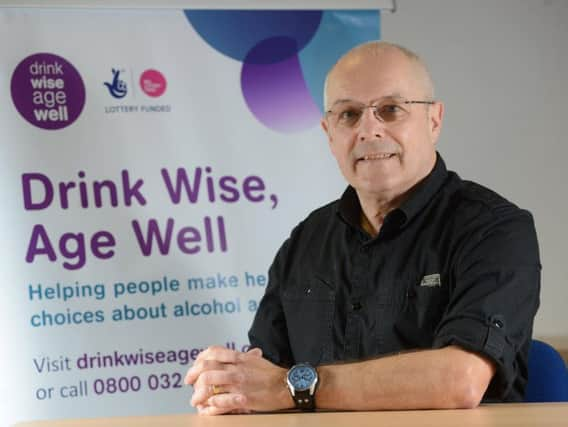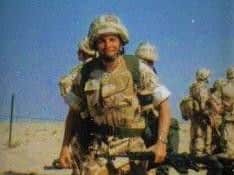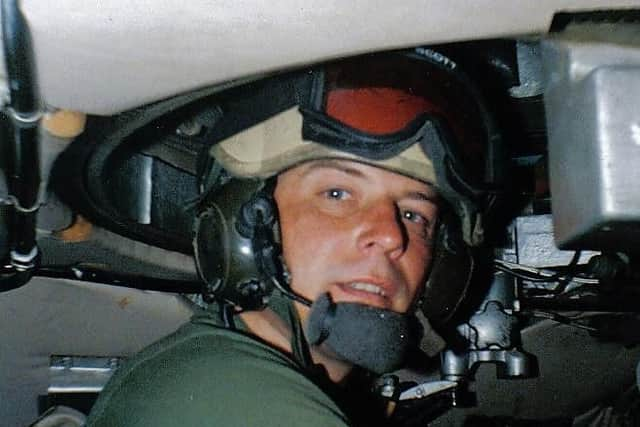Danny's toughest battle: How former sergeant major fought alcoholism that almost killed him


Sergeant Major Danny Webb knew life outside the military would be even harder than he had anticipated when the Gulf War veteran who had been responsible for hundreds of soldiers just months before was offered his first job as a civilian; he was asked if he would like to dress up as a clown and go into schools to promote a recycling initiative.
“I was expecting to be fighting employers off when I came out of the military. But how do you put down what we had been doing on a CV?”
Advertisement
Hide AdAdvertisement
Hide AdAfter spending his entire adult life in the Army, and savouring the camaraderie, discipline and focus that came with it, he struggled with life on civvy street after leaving the military at the age of 42 - gradually descending into an all-consuming alcohol addiction that eventually led to him living in his shed, getting in trouble with the police and making three suicide attempts.


Now 60 and sober for the last three years, Danny now gives presentations to fellow veterans and groups struggling with addiction issues, as well as supporting the ‘Drink Wise, Age Well’ initiative designed to help people make healthier choices about their alcohol use as they age.
He knows from personal experience how easy it can be to sink into alcoholism; and just how difficult it can be to free yourself from the grip of addiction.
“Alcoholism is like being in a lift going to a basement. You start on the ground level and you are probably a social drinker. Then you start going down the levels of drinking more, then drinking on your own, down to the level where you have lost your driving licence, then where you have lost your job, then where you have lost your house, then your family. You can go down many levels before you reach rock bottom.”
Advertisement
Hide AdAdvertisement
Hide AdBorn in Sheffield and now living in a village a few miles to the north of the city, Danny had wanted to be a soldier for as long as he could remember.


“It had always been my ambition to join the Army since I was a toddler. I don’t know what it was, I just used to watch anything to do with the military, things like documentaries and war films.”
He joined the Royal Engineers at the age of 20 and after completing his 20 weeks of training was posted to Germany. Danny was soon sent for a tour of Northern Ireland at the height of The Troubles.
He spent 13 years in Germany with his wife Sue and the couple’s two sons were born there. Danny went on to serve in the first Gulf War in 1991 and despite seeing some horrendous sights, says he regrets the conflict ended so quickly - believing the Allied Forces should have pushed on to remove Saddam Hussein when they had the chance.
Advertisement
Hide AdAdvertisement
Hide AdDanny gradually progressed through the ranks and was made a Sergeant Major at the age of 40. But he failed to get another promotion which would have allowed him to apply to become a commissioned officer and stay in the military for another decade. Instead, after service lasting 22 years and six days, at the age of 42 Danny left the military for life as a civilian.


He says while he loved everything about life in the military - from the tours of duty to the camaraderie and the job itself - adjusting to being outside was a shock to the system.
But he had prepared for his departure from the military and took a foundation degree in Training and Development.
After turning down the clown job offer, he got a job teaching basic life skills to unemployed teenagers - but says to his disappointment he found the job “terrible” - largely because he struggled to deal with the lack of motivation from many of the people he was assisting; a stark contrast to the type of people he had been in the Army with.
Advertisement
Hide AdAdvertisement
Hide Ad“I had come from an environment where you had a mission and you worked hard to achieve it. In the Army, I had been ‘work hard, play hard’. But it was at this stage my drinking started to increase.


“I went from a couple of cans in the evening to four cans and then to however many I could fit in. I felt I needed to reach a certain level for me to be happy. That level seemed to be harder to achieve so I needed more and more alcohol.
“It crept up on me. My drinking problem changed to a point where I would get in a state where I didn’t care about anything. I started to drink stronger stuff like white cider - it is not nice but it is cheap and eight per cent strength and had the desired effect. From there I moved on to vodka. I was starting to hide bottles in my house. I even used to hide them in a farmer’s field where I walked the dog and just go and drink them there.
“I was feeling shameful, I knew I was drinking too much and it was starting to affect me. On day, me and my wife Sue were out walking the dog and I was wobbling down the street. She said you need to get some help. That evening, we were watching Coronation Street and on came Peter Barlow, who was in a scene saying ‘My name is Peter and I am an alcoholic’. That was the moment, it prompted me to phone Alcoholics’ Anonymous.”
Advertisement
Hide AdAdvertisement
Hide AdHe still remembers the date - June 1, 2009 - and says it was frightening to admit he had a problem. “To me, it was a weakness. Soldiers aren’t supposed to be weak, we are strong. I’m supposed to be the provider for the family and I had this weakness.”
But after 18 months of hard-won sobriety, he had a relapse following a number of family bereavements in a short space of time. “It was a case of thinking ‘one won’t hurt’. However, I was soon back to drinking a bottle of vodka every day.”
Danny says he kept trying to get dry and then relapsing, with each occasion becoming more extreme. “It was destroying me. With my last relapse, I was starting to smash things up in the house like the furniture and computers. I tried to kill myself three times as I couldn’t see a way out of this madness that was destroying everything and everybody around me.
“I was living in my shed for a week in my combat gear, only coming in the house to get tins of beans and more drink. My wife was on her own and it must have been terrifying. I started getting in trouble with the police and getting into fights. My wife found me a couple of times asleep on park benches in Sheffield. It was heartbreaking for Sue but at that time, I didn’t care as long as I could get more booze.”
Advertisement
Hide AdAdvertisement
Hide AdThings came to a head when he appeared in court where the judge warned him he had to sort his life out or face the prospect of prison time. It was a wake-up call he took to heart and he has now gone without a drink for three years.
He says one of the hardest - but ultimately most rewarding - parts of dealing with alcoholism is directly addressing the pain you have caused your loved ones with your behaviour.
“The main people I hurt were my family, my wife and my sons. It was really difficult to talk about the things I had done. You are building a lot of bridges and it takes time. But those bridges have been built.
“My boys accepted I had got a problem, that I was ill and it wasn’t me. Sue stuck with me because she knew it wasn’t me, it wasn’t the Danny she married.”
Advertisement
Hide AdAdvertisement
Hide AdNow almost 20 years after the end of his military career, Danny has a new mission in life; helping others come through similar experiences to those that he has dealt with.
After his court appearance, he was referred to Sheffield Treatment and Recovery Team and Mental Health Services.
In 2016 made a film about his and other people’s journeys for the Sheffield Recovery Community for a project called Voices of Recovery. He went on to be asked to be a volunteer for both Drink Wise, Age Well and the Addaction ‘Right Turn’ group in Sheffield, which provided specialist support for veterans with substance misuse issues. Danny also now gives talks across South Yorkshire about his journey, as well as providing training for NHS staff on dealing with addiction issues among military veterans.
He says he has a simple message to those struggling with their drinking; accepting there is a problem is the first step to solving it. “It seems easy to say when you have come through it but you have to face it and admit you have a problem. Once you have admitted it, you can do something about it. It is worth coming through to the other side.
Advertisement
Hide AdAdvertisement
Hide Ad“There will be hundreds and thousands of people out there in denial.
“Every day I wake up is a bonus now. I should be dead.”
Alcohol-related harm increasing among over-50s
The number of people aged over 50 experiencing alcohol-related harm is increasing - driven in part by the stigma around asking for help.
A major study for Drink Wise, Age Well found one in five people aged 50 plus who drink do so at a level that increases their risk of harm but 80 per cent of respondents at increased risk from their drinking had never been asked about their alcohol use by family, friends, or a health professional.
Julie Breslin, Head of the Drink Wise, Age Well programme, said: “Significant cultural changes and an ageing population means harmful drinking in the over-50s is showing up in national statistics as never before.
Advertisement
Hide AdAdvertisement
Hide Ad“Increasing alcohol consumption in our ageing population has been well documented, but the reasons behind it less so. Approximately one in three older adults with an alcohol problem first develop it later in life, often for changes we will all go through. Retirement and bereavement can leave older adults feeling isolated and drinking at home to cope.
“There is particularly strong stigma around drinking later in life, preventing people from getting the help they need to live healthier lives.”
Drink Wise, Age Well operates in Sheffield, as well as Glasgow, Devon, Wales and Northern Ireland.